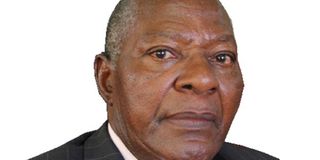We are not yet civilised enough to abolish death sentence

Jenkins Kiwanuka
What you need to know:
- We indeed have some good citizens in our country, but we don’t yet qualify to have the death sentence abolished.
Mr Kiwanuka is a journalist, retired Foreign service officer and author. - Civilised world; yes. But can you commit or witness all the atrocities that are going on in our society and still count oneself among the civilised peoples of this world? Respect for human dignity; yes.
I am shooting drug dealers in my country”, said President Rodrigo Duterte of the Philippines in response to Western criticism of Manila’s anti-drug campaign that had killed more than 300 people in three months. He took office at the end of June this year.
“But in their country”, he said in reference to the United States of America in particular,” the police shoot innocent black people....even after the victim has fallen down they pump more bullets into his body”.
I didn’t like Duterte’s comment because I hate extrajudicial and arbitrary killing of people whatever their race or part of the world they come from. Why instead of killing people, many of whom are in their teens, doesn’t he build rehabilitation centres for them?
Not short on profanity, Duterte had earlier described retiring US President, Barrack Obama, as ‘son of a whore’ before telling him ‘to go to hell’.
Although he later apologised, Duterte also infuriated the Jewish community the world over when he claimed that while Hitler killed six million Jews, he had three million drug addicts in the Philippines whom he would be happy to exterminate.
The only thing I can say in president Duterte’s favour is that some of the leaders in the countries that are condemning him for violating his people’s human rights have on their part done little, if not nothing at all, to wipe out the drug problem in their own countries or regions under their influence. There are even reports that some of them collaborate with the drug producers, users and sellers in promoting the drug trade.
Here in Uganda, police personnel are often seen cutting down drug-related herbal plants in the countryside, and there were reports recently that police authorities are being investigated about a big consignment of cocaine which disappeared after they had taken it into their custody as an exhibit.
My main concern in writing this story is about a relatively different subject though. The death sentence still exists in Uganda, but in 2009, the Uganda Supreme Court delivered a landmark ruling in one criminal case which culminated in the release of some people who were on death row and the commuting to life imprisonment of some death sentences. The court also declared as ‘unconstitutional’ the ‘mandatory death sentence’ which requires a court, upon conviction, to sentence the convicted person automatically to death. Some parliamentarians were recently reported to be proposing to amend the Constitution and ensure that the death sentence is retained with or without the ‘mandatory’ appendage to the legislation.
Those parliamentarians, your columnist as well as a large section of peace-loving Ugandans are sickened by the heinous and grotesque criminal acts such as child sacrifice, the shooting, strangling and stabbing to death of people with impunity, murders within families, all of which have escalated since 2009.
There is a section among our people, particularly those who studied criminology at school such as the boss of Uganda Prisons, who have all along been pleading for the abolition of the death sentence. They contend that capital punishment has no place in a civilised world, that it is an ancient form of punishment that is contrary to modern penal policy. That policy, they observe, thrives on principles of respect for human dignity ‘without exception’.
Civilised world; yes. But can you commit or witness all the atrocities that are going on in our society and still count oneself among the civilised peoples of this world? Respect for human dignity; yes. But can you demand dignity when you don’t deserve it, and when you live in a community that still indulges in all the indignities that prevail within our society?
We indeed have some good citizens in our country, but we don’t yet qualify to have the death sentence abolished.
Mr Kiwanuka is a journalist, retired Foreign service officer and author.




